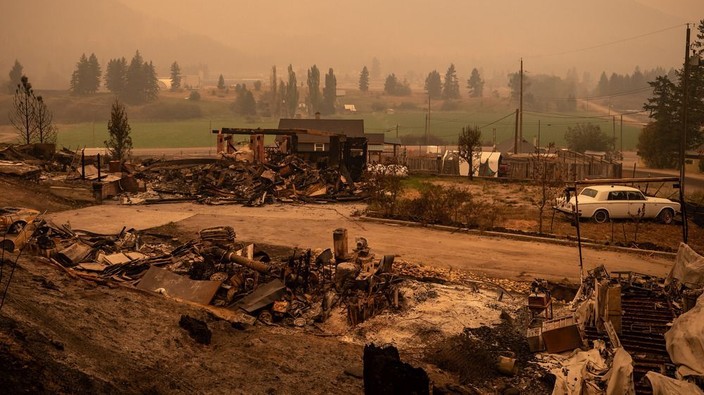opinion: b.c. responds to wildfires' impacts on mental health
this summer’s events affect the mental health and well-being of many people throughout the province. there are things we can do to steady ourselves, including asking for help

thick smoke fills the air and nearly blocks out the sun as a property destroyed by the white rock lake wildfire is seen in monte lake, east of kamloops.
darryl dyck
/
the canadian press
by: sheila malcolmson and jonny morrisif you are feeling grief, anxiety, or stress around disasters and health emergencies, you’re not alone.wildfires, smoke, and extreme weather such as heat waves have powerful impacts on our physical health, the environment and our mental health — for those affected today, and those living through these experiences again.this is a very difficult time for many people in b.c., who have also been coping with the pandemic and drug poisoning crises, and the confirmation of unmarked graves at former residential school sites. these events have disproportionate effects on indigenous and métis peoples, as well as vulnerable people experiencing homelessness, living with a disability or with mental-health and substance-use challenges. our hearts go out to everyone who has been affected by these profound challenges.there are things we can do to steady ourselves:prepare.have a clear emergency plan and grab-and-go kit ready so that you can focus on other priorities.ask for help.talk things through, name how you’re feeling and reach out to family, friends or a helping professional. if you have been evacuated, you can also ask an emergency support services volunteer about the mental health or counselling support available to you.help others.assisting others can help us regain a sense of purpose and community as we confront challenges together. small actions can make a big difference.it is critical that we do all we can to help people access mental health supports following a disaster. that’s why the province and other community partners, like the canadian mental health association (cmha bc), are working together to coordinate and strengthen resources to help people cope with these circumstances.first, confidential mental health support is available 24/7 at 310-6789 through b.c.’s crisis line network. youth aged 12-24 and their caregivers can check out foundry, foundry virtual, and the foundry b.c. app at foundrybc.ca. post-secondary students can reach out at here2talk.ca and health-care workers can text or call caretospeak at 1-866-802-7337.second, community members affected by wildfires or floods can find support through the provincial health services authority’s disaster psychosocial team. services may be virtual or in-person and include both individual and community-level support. the canadian red cross is also in wildfire-affected communities providing a range of critical supports on the ground. if you have been evacuated, you can ask an emergency support services volunteer about these resources. if you are overwhelmed and not sure where to go for support, call 211 for information and referral services any time.third, if you or a loved one is experiencing mental health or substance use challenges, you can find virtual low- and no-cost mental health supports online, including low- and no-cost counselling services at gov.bc.ca/mentalhealthsupports.our work together will continue into the fall because we recognize this summer’s events will continue to affect the mental health and well-being of many people throughout the province. cmha bc and partners will provide mental health and disaster recovery courses in affected communities, including efforts led by cmha vancouver-fraser to deliver their resilient minds program to members of the b.c. wildfire service.all levels of government, community agencies and partners will continue to support this work as we build a robust and responsive mental health and addictions system that fosters well-being and resilience. that’s our goal and our commitment to all british columbians.there is hope and there is help. we encourage you to reach out and to support those around you to do the same.
phone support:b.c. mental health support phone line for 24/7 confidential support: 310-6789 (no area code needed)kuu-us crisis line for indigenous people: 1-800-588-8717kids help phone: 1 800-668-6868 or text 686868crisis line: 1-800-784-2433bc 211sheila malcolmson is minister of mental health and addictions; jonny morris is chief executive officer, canadian mental health association, b.c. division.
learn about the disaster psychosocial services program from phsa: tinyurl.com/disasterservicesphsafor resources on coping with crisis, visit the red cross: tinyurl.com/copingwithcrisisredcrossfind virtual mental health supports here: gov.bc.ca/mentalhealthsupports
phone support:b.c. mental health support phone line for 24/7 confidential support: 310-6789 (no area code needed)kuu-us crisis line for indigenous people: 1-800-588-8717kids help phone: 1 800-668-6868 or text 686868crisis line: 1-800-784-2433bc 211sheila malcolmson is minister of mental health and addictions; jonny morris is chief executive officer, canadian mental health association, b.c. division.
learn about the disaster psychosocial services program from phsa: tinyurl.com/disasterservicesphsafor resources on coping with crisis, visit the red cross: tinyurl.com/copingwithcrisisredcrossfind virtual mental health supports here: gov.bc.ca/mentalhealthsupports
 3 minute read
3 minute read





